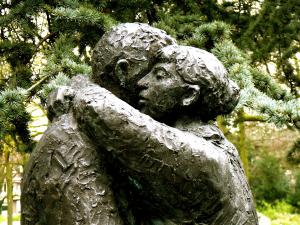
Christianity is a religion of forgiveness. Mercy and grace are offered to people so that they do not have to suffer the full consequences of their actions. This means, we are set free from a purely legalistic interpretation of life, one which views the world as a closed system, and every action must have an opposite and equal reaction. Grace opens up the system, so that the consequences of one’s actions do not have to be equal to the action themselves, for grace can come in and heal the imbalance created by sin. Nonetheless, though someone can be forgiven without having to make restitution which is equal to the harm which they caused due to their sin, this doesn’t mean the moral implications of the law can and should be ignored. Grace needs to be cooperated with in order to be effective; those who continue to act as if their sins are unimportant, and assume forgiveness without trying to correct themselves, do not cooperate with grace and so will suffer various consequences for what they do.[1]
Forgiveness does not make things return the way they were in the past. Forgiveness doesn’t mean everything is forgotten as if the sin did not happen. Penance is still required, and with penance, comes restitution, something which, for grave sins, might take a lifetime (or more) for someone to truly work out and overcome. Even with forgiveness, what a person has done in the past can and will shape what is possible for them in the future. Sins corrupt the will of the sinner, establishing bad habits in them; the more they sin, the more they will establish bad habits, making it that much more difficult for them to stop sinning when they want to do so. They will have to treat their sin like an addiction, so that, just as alcoholics have to avoid alcohol, so they will need to avoid the occasions which would encourage them to fall back to their sin.
In patristic times, Christians understood the way sin tainted the will, which is why those who confessed their sins not only found their penance to be lengthy in order to make sure they confronted and overturned habits which would otherwise incline them to sin again, but they also found various sins affected the positions they could hold in the church (or society). Clergy, for example, found many sins would strip them of their status and, even though they were forgiven through penance, they would never be able to serve as a minster in the church again.[2]
Taking sin seriously, and understanding how it can and should influence what is possible for someone who has committed various grave sins, does not mean we should not be merciful. Sinners need our love and mercy. We need to remember that they were made in the image and likeness of God. Their sin has covered up and defiled that image, making it hard for us to see it, but it is there. It remains there, even with the worst of sinners, and it is this foundation, this good foundation, which lies in everyone. We must desire to free that good from the evil contaminating it, and if we do so, then we will find ourselves even desiring good for those who do evil, even for those who wish us evil, not because we approve of what they have done but rather, because we hope that they can change and reveal the image of God within.
When we show some sinner love, when we show them mercy, when we hope for their change, we reveal the kind of faith which we have, for, as Ficino recounted, all love requires faith. [3] It takes much faith to love a person who has made it difficult for us to love them, to show mercy to those who most need that mercy. But this is exactly what is needed, for it is in and through such love and mercy some people will find the healing which they need, and without it, it is as if we were mixing poison into an open wound, making sure they would only get worse, as St. Hildegard understood: “For whoever applies scourges to an already festering wound brings forth poison mixed with blood. This is not productive. So it is with the mind of a person who will not , under any circumstances, be merciful.”[4]
We need to be merciful, even as we need mercy for ourselves. We know from our own experience the way mercy and kindness can and does influence us to be better, while people who only deal with us in a legalistic excess only make us fight back, rejecting the good because we feel the good has rejected us and has no place for us with it. Mercy is important, because it gives hope, and only with such hope will people be willing to do what is necessary to change their ways. If they think there is no hope, they will not see any reason why they should change. Truly, the poison of unmercy makes someone worse, and those who use that poison are culpable for what happens next.
Thus, it is important for us to be merciful to others, so that we can receive the benefits of mercy ourselves. To receive forgiveness, we must be willing to forgive others. If we do not show mercy, we will be culpable for the harm which we have caused others, and so long as we continue to harm others, and not repent, we will cut ourselves off from the forgiveness which we need in order to begin our proper spiritual progress. We need to embrace spiritual love, a love which motivates us to be compassionate on all. “There is no other path toward spiritual love, which forms the invisible image, except by first beginning to show compassion in proportion to the Father’s perfection, as our Lord said.” [5] When we open ourselves to compassion, when we care about others, including sinners, including the worst of sinners, we take God seriously, because we take the image and likeness of God in them seriously. With it, we will hope for and desire the salvation of all. This does not mean the path of salvation will be easy, for everyone will have to work out their own salvation, dealing with the consequences of their sins. Grace aids people as they make restitution, making such restitution possible, for without it, the bondage of sin would be too much.
Being forgiven, receiving mercy and grace, does not mean we forget what we have done and ignore it, but rather, we take it seriously, realizing our actions affect us and our future potential. Likewise, forgiveness and grace are not cheap; they come with expectations, as the person who receives them must seek to change and free themselves from the corruption of sin. For so long as we sin, we create the conditions for our own suffering, but once we overturn sin from within, we will no longer seed such suffering for ourselves and so we will be able to find, with grace, freedom not only from sin but from the suffering it creates as we become pure at heart and enter into beatitude.
[1] This is not to say they will have no grace, that their suffering will be equal to the harm which they have caused; rather, they will have to deal with the consequences of their sins more than those who work with grace and put an end to their sin
[2] Perhaps, with the various crises found in the institutional church today, Christians need to study and learn from these restrictions, and find a way to apply them today. This would be one way for the church to show it is starting to take such sins seriously.
[3] “My dear friends, all love, as the proverb says, requires faith. Therefore I have decided to respond to your great love towards me as best I can with the greatest faith. But if perfect faith is in need of any witness, then my letter will bring with it this most potent testimony of my faith in you, a book written by us on true faith,” Marsilio Ficino, The Letters of Marsilio Ficino. Volume 5 (Liber VI). trans. by members of the Language Department of the School of Economic Science, London (London: Shepheard-Walwyn, 1994), 70 [Letter 46].
[4] St. Hildegard of Bingen, “Letter 270r” in The Letters of Hildegard of Bingen. Volume III. Trans. Joseph L Baird and Radd K Ehrman (Oxford: Oxford University Press, 2004), 66.
[5] Saint Isaac the Syrian, The Ascetical Homilies of Saint Isaac the Syrian. Trans. Monks of the Holy Transfiguration Monastery. Rev. 2nd ed (Boston, MA: Holy Transfiguration Monastery, 2011), 118 [Homily 1].
Stay in touch! Like A Little Bit of Nothing on Facebook.
If you liked what you read, please consider sharing it with your friends and family!













